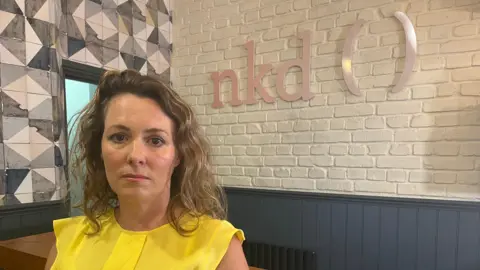Rebecca Dowdeswell, the owner of a beauty salon named nkd, expressed her readiness to continue fighting in an ongoing trademark dispute with the global cosmetics giant L’Oréal. This legal battle has dragged on since Dowdeswell attempted to renew the trademark for her Leicester-based business in 2022, a move that was opposed by L’Oréal, which claims rights to the trademark of its own beauty products branded as “Naked”. L’Oréal argues that Dowdeswell’s use of the name “nkd” could potentially confuse consumers.
Dowdeswell, a 49-year-old salon owner from Radcliffe-on-Trent in Nottinghamshire, is said to be in a stronger position now that a hearing date has been set by the Intellectual Property Office (IPO) for November 5. Dowdeswell believes the long-standing fight is justified as she has held the nkd trademark since 2009, although it expired in 2019. The salon owner acknowledged that she missed the renewal deadline during a chaotic period, significantly impacted by the COVID-19 pandemic—a situation she referred to as her “big mistake”. She explained that her six-month grace period to renew the trademark coincided with the onset of COVID-19, leading to missed opportunities.
The dispute led to L’Oréal’s objections, which were based on the company’s ownership of the Urban Decay brand, known for its array of Naked-branded products such as eye shadow palettes. However, Dowdeswell disputes the claims of consumer confusion. She emphasized that throughout her 15 years in business, no customer has ever raised the concern of confusion with L’Oréal’s Naked branding.
Over the past three years, Dowdeswell has incurred costs exceeding £30,000 in defending her trademark against L’Oréal’s opposition. She reflected on the psychological toll of navigating the ongoing proceedings, acknowledging that it strained both her personal life and her responsibilities as a mother to young children. Despite the difficulties, she articulated her determination, stating that she is prepared to confront L’Oréal again, contrary to their potential belief that she would back down.
In terms of progress in the legal arena, while the IPO initially postponed the hearing due to increased caseloads post-Brexit—which includes the transfer of 1.4 million EU trademarks to the UK—Dowdeswell has welcomed a sense of closure with the hearing date on the horizon. She indicated a renewed sense of optimism and readiness to present her case officially. Meanwhile, L’Oréal has reached out through a spokesperson, expressing a commitment to resolving any misunderstandings with Dowdeswell and reinforcing their longstanding trademark rights.
The ongoing challenges faced by Dowdeswell illustrate not only the complexity of trademark law but also the impact of such legal disputes on small business owners. As her hearing date approaches, she hopes for a resolution that will favor her brand and allow her salon to continue operating without the shadow of prolonged legal challenges. The outcome of this case, expected to be determined around nine months following the hearing, may set significant precedents for future trademark disputes between large corporations and independent business owners, especially in the beauty industry.
Dowdeswell’s case has gained attention for its implications for small business owners facing legal challenges from larger entities and highlights the persistent struggle for intellectual property rights in an increasingly competitive market.












